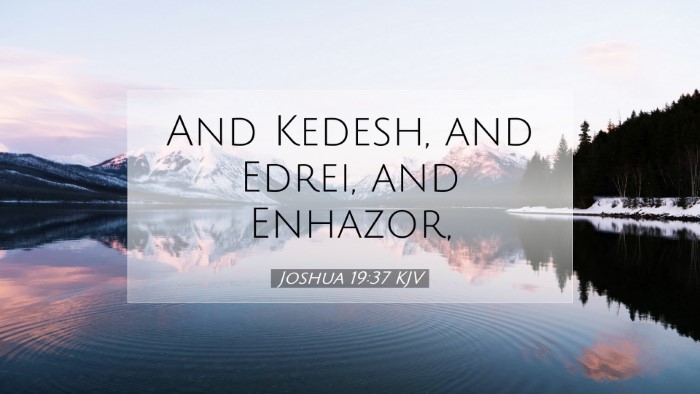Commentary on Joshua 19:37
Joshua 19:37 states: "And Kedesh, and Edrei, and En hazor," in the enumeration of cities within the territory allocated to the tribe of Naphtali. This verse, although brief, holds significant implications for the understanding of Israel's territorial divisions, the fulfillment of God's promises, and the historical context of the tribes.
Context of the Verse
The passage comes during the distribution of the land of Canaan among the tribes of Israel after their conquest led by Joshua. This section is pivotal as it outlines the inheritance of the tribes, which reflects both the historical reality and the divine orchestration of their settlement.
Geographical Significance
- Kedesh: This city becomes notable as a refuge city. It illustrates God's provision for justice and mercy, allowing those who unintentionally commit manslaughter a space to flee and find safety.
- Edrei: Edrei speaks to the military prowess of the Israelites post-conquest. This city was associated with formidable battles, specifically against Og, the king of Bashan, underscoring God's strength in delivering Israel from their enemies.
- En Hazor: The mention of Hazor, previously destroyed by Joshua, represents the eradication of Canaanite influences from the promised land. It signals a new era for the people of God and reinforces their identity as a chosen nation.
Theological Insights
From the perspective of theological commentary, Joshua 19:37 serves to further illustrate God's faithfulness. The precise allocation of cities confirms the fulfillment of earlier promises made to Abraham, Isaac, and Jacob regarding the inheritance of the land.
Matthew Henry's Insights
Matthew Henry emphasizes the providence of God in these distributions, noting how each city comes under God's sovereign plan. He reflects on the moral responsibilities that come with these inheritances, suggesting that Israel is to remain faithful stewards of the land given to them. He highlights the historical importance of each location, particularly how they provide markers of God’s faithfulness to Israel.
Albert Barnes' Reflections
Albert Barnes indicates that the cities listed are strategic not just geographically but also ecclesiastically. He notes that these cities reflect the aspirations of the tribe of Naphtali, who were known for their valor and courage in battle. Barnes further engages with the imagery of these cities, calling them symbols of the refuge that God provides, a theme mirrored throughout the scriptures, extending even to the New Testament with Christ as our refuge.
Adam Clarke's Analysis
Adam Clarke approaches this verse with attention to etymology and cultural significance. He delves into the meaning behind the names of the cities, suggesting layers of meaning that could enrich a deeper understanding of why these particular locations were chosen. Clarke also draws parallels between the biblical text and current theological interpretations concerning cities of refuge and safety found in Christ.
Application for Modern Believers
The allocation of land and cities in Joshua 19:37 offers modern believers insight into God’s ongoing promise of inheritance. This principle is echoed in New Testament theology, where believers are promised an eternal inheritance (1 Peter 1:4). Furthermore, the cities symbolize places of safety and refuge, indicating that believers can find solace and peace through their relationship with Jesus Christ, the ultimate refuge in times of trouble.


